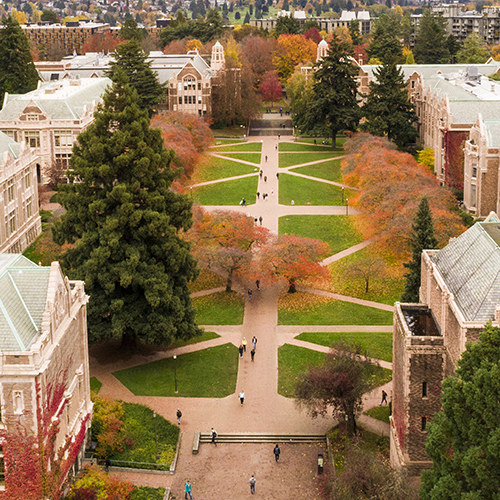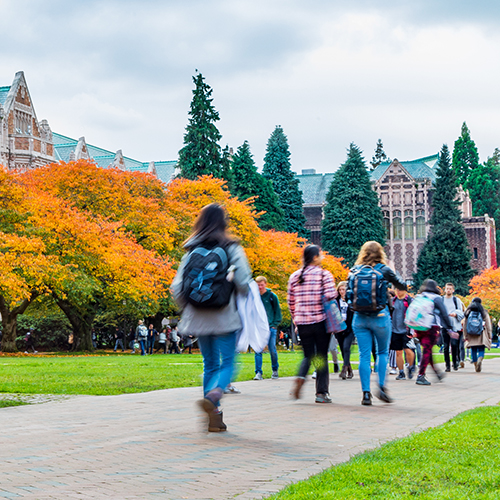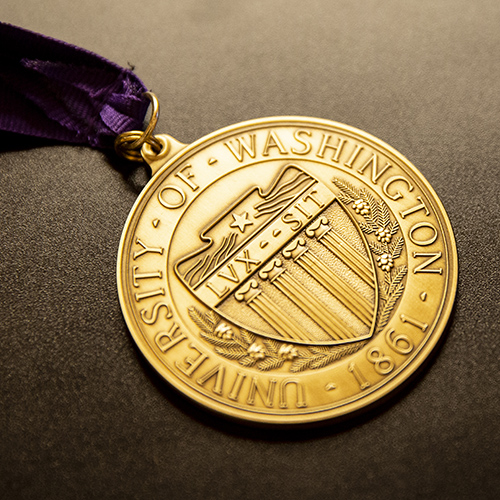At 12 years old, Erin Earl was in seventh grade. Six years later, she’s graduating from the University of Washington with a triple degree in applied music, music theory, and computer science. Along the way, Earl has so impressed her professors that she’s been selected as the 2003 Dean’s Medalist in the Arts.
The College of Arts and Sciences selects four medalists each year—in the arts, humanities, social sciences, and sciences—based on their academic records and recommendations from faculty. “It’s our opportunity to celebrate the exceptional accomplishments of our best students,” says David Hodge, dean of Arts and Sciences. “The challenge is selecting just four students. We have so many accomplished undergraduates each year.”

Erin Earl was an obvious choice. Although she is younger than most graduating seniors, she has impressed both music and computer science faculty. Her applied music degree is in piano performance; pianist and School of Music Chair Robin McCabe describes Earl as “among the top five percent of students that I have taught here, at the Juilliard School, and at conservatories from Tokyo to Prague.”
Comments from computer science faculty are equally glowing. “I believe that Erin is destined for some kind of greatness,” says Richard Ladner, professor of computer science. “It is difficult for me to understand how she can do so much both in computer science and in music. She is an amazing talent.”
Earl came by her interest in computer science naturally—both of her parents are computer programmers. She credits her parents with sparking her interest in piano as well. “They went to Costco and got an electronic piano for me when I was seven,” she recalls. She was hooked when she won her first piano competition at age nine and still loves performing.
Earl found a way to combine her interests in music and computer science through a two-year research project with Professor Ladner that focused on data compression in music, using musical ideas to find structure in Bach compositions.
Between research and piano practice, how did she complete a triple degree? By taking an almost impossibly heavy course load. “My maximum was 23 credits in a quarter,” Erin says. (An average load is 15 credits.) “The first time I did that, I swore at the end of the quarter that I’d never do anything like that again. But two quarters later, I did it again.” She adds with a shrug, “There are things I want to take and things I have to take, and between the two of them, it adds up.”
Jeff Giansiracusa, Dean’s Medalist in the Sciences, understands taking on extra work. A double major in mathematics and physics, he was involved in a research project with Physics Professor George Bertsch for three years and spent his summers pursuing research opportunities at the National Superconducting Cyclotron Laboratory at Michigan State University, at CERN—the world’s largest particle physics lab—in Switzerland, and finally at the UW, through the Mathematics Department’s Research Experiences for Undergraduates program.
Not bad for a student who, in high school, didn’t envision himself going to college. “I planned to enroll in a training program to be a video game programmer,” admits Giansiracusa. “But when I toured the training program, I realized I was already at the same level as most of their programmers. That motivated me. My senior year of high school, I became more academically focused.”

Giansiracusa applied to four universities, including Stanford and M.I.T., but was only accepted to the UW. “I was disappointed for my first quarter,” he admits. “Then I realized I could get whatever I wanted at the UW if I just looked for it.”
And look he did. In addition to participating in research, Giansiracusa took on challenging courses—including second and third-year graduate courses. “Jeff’s classroom abilities exceed any student I have ever taught,” says Mathematics Professor James Morrow. “His training is at the level of our superior second year graduate students, and he has typically been one of the best students in his graduate classes.”
In his “spare” time, Giansiracusa participated in a grueling national mathematics competition for three consecutive years. Remarkably, his team earned top honors twice.
Giansiracusa’s next stop? He plans to study at Oxford on a National Science Foundation fellowship, and then earn his mathematics Ph.D. at M.I.T., where he has already been accepted—four years after being rejected as an undergraduate. “I applied to several schools that had rejected me four years ago,” he says. “I got to say ‘no’ to most of them this time around.”
When Giansiracusa arrives at Oxford, he may see a familiar face: Paul Vronsky, Dean’s Medalist in the Social Sciences, who is heading to Oxford on a Marshall Scholarship.
The Marshall Scholarship is just one of many awards for Vronsky, an economics major. He earned the UW’s Freshman Medal as the University’s top freshmen in 2000 and a year later earned the UW’s Junior Medal. He might have earned the Sophomore Medal as well had he not accrued so many credits through advanced placement and heavy class loads that he effectively skipped his sophomore year.
“Vronsky combines a first rate intellect with extraordinary personal and leadership skills,” says Neil Bruce, professor and chair of economics. “In all respects, I have found him to be a fine scholar, a superb leader, and a person of great integrity.”
Vronsky’s family moved to Federal Way from his native Poland when he was eight years old. He has always had an interest in economics, but a lecture course with Economics Professor Paul Heyne, now deceased, “sealed the deal,” he recalls. “It was a class with 750 people, and everyone showed up, even at 8:30 a.m. I’ve never seen that in another class.”
Student government also interested Vronsky. He joined the legislative steering committee of the Associated Students of University of Washington (ASUW) and a year later spent winter quarter in Olympia as the ASUW’s lobbyist. He also served on the Economics Department’s Undergraduate Committee and Undergraduate Board.
Somehow Vronsky managed to squeeze in tutoring each year as well. First he provided math tutoring to students at Seattle’s Meany Middle School; then he tutored UW economics majors. For the past two years he has tutored at the UW’s Educational Opportunity Program Instructional Center—recruiting quite a few economics majors along the way. “Seeing students become really excited about economics and become majors is a thrill for me,” he says.
After his two-year stint at Oxford, Vronsky is headed for Stanford Law School and a career in law. Of his numerous honors, he says, “The awards and recognition are great, but they’re after the fact. The pride in my life stems from other, more abstract, things.”
For Juliane Gust, Dean’s Medalist in the Humanities, receiving top undergraduate honors was a bit of a surprise. But her life has been full of surprises.
Gust grew up in Germany. In tenth grade, she attended high school in Everett, Washington for three months as part of an exchange program, where she began dating an American student. She returned to Germany to complete high school and three semesters of college, but eventually married her high school sweetheart from Everett. He was enrolled at the UW, so she decided to study at the UW as well.
Gust has been interested in linguistics, particularly the neural basis of language, so she became a linguistics major, later adding neurobiology as a second major. “I realized that to get anywhere near answering the questions I had, I needed to understand how the brain works,” she says.
Like the other medalists, Gust was eager to tap the research opportunities at the UW. She began working with Biology Professor Martha Bosma, doing research on the hindbrain. “From the beginning, Jule was set to go,” says Bosma. “She is functioning at the level of a graduate student, and her body of work would comprise a thesis for any graduate student in our department.”
For Gust, the research has been invaluable. “I get to apply what I learn in the classroom,” she says. “Now I understand how knowledge is created—how difficult and ambiguous it is.”
The research also has led to presentations at conferences and publication of a paper (with Gust as the first author) in the prestigious Journal of Physiology. “I’m stunned that, as an undergraduate, I got to do this,” says Gust. “I didn’t think it was possible.”
Gust will continue with her research while applying to MD/Ph.D. programs in neuroscience. But before beginning that new chapter, she is trying to appreciate what she has already accomplished.
“I didn’t have expectations about what I could do when I came to the UW,” she admits. “The faculty have been incredibly supportive, helping me do things I didn’t know were possible to do. They helped me think big. They put so much faith in me. That’s made all the difference.”
More Stories

A Nobel, an Inventor, a Polymath & More
Recent awards and appointments celebrate Arts & Sciences faculty and staff for their research, leadership, and more.

Meet Our 2024 Graduate Medalists
Meet the three students selected by the College of Arts & Sciences as 2024 Graduate Medalists for their accomplishments.

Celebrating Excellence in Arts & Sciences in 2024
This spring, the UW and the College of Arts & Sciences celebrated faculty, staff, and students for their many accomplishments.